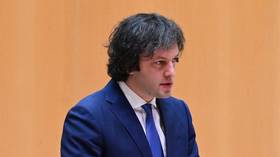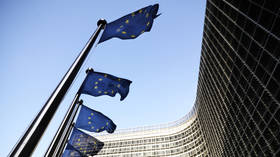EU candidate country rejects demands to sanction Russia

Georgia will continue to resist calls to impose sanctions on Russia, Prime Minister Irakli Kobakhidze said on Tuesday. Tbilisi previously declined to join Western countries in adopting restrictions on Moscow, citing domestic security concerns.
At a meeting in Brussels with the top EU diplomat, Josep Borrell, Kobakhidze was asked by reporters about Kiev's demand for “a second front” against Russia.
“These statements were very regrettable,” the PM said. He stressed that Georgia is providing “strong political support” for Ukraine and is sending humanitarian aid to Kiev.
“As for the sanctions, we have a very clear position on this matter. We are not imposing sanctions, and we have strong arguments for doing so,” Kobakhidze explained, adding that Tbilisi will not be “used to circumvent” the third-party restrictions placed on Moscow.
Borrell promised to “pass messages to the Ukrainian side of the good will of Georgia to have the best possible relations.” He further argued that quarrels between the two states would only “benefit” Russia. He also promised to continue working with Georgia, which in December 2023 was granted candidate status for eventual EU membership.
In 2022, Ukraine’s National Security and Defense Council chief Aleksey Danilov urged Georgians to “stand up and defend their country” against Russia. President Vladimir Zelensky’s top adviser, Mikhail Podoliak, similarly criticized Tbilisi's stance, arguing that “values are more important than profit.”
Georgia formally cut diplomatic ties with Russia following the five-day military conflict in August 2008. Russia has since recognized Georgia’s breakaway regions of Abkhazia and South Ossetia as independent countries. Georgia continues to accuse Russia of “illegally occupying” parts of its territory.
Nevertheless, Tbilisi has maintained that imposing economic on Moscow would create unacceptable risks. “Georgia does not intend to impose any bilateral sanctions because of the national interests of our population,” Shalva Papuashvili, the speaker of the country’s parliament, said last year. He added that Georgia does not want any “escalation” with its northern neighbor.













